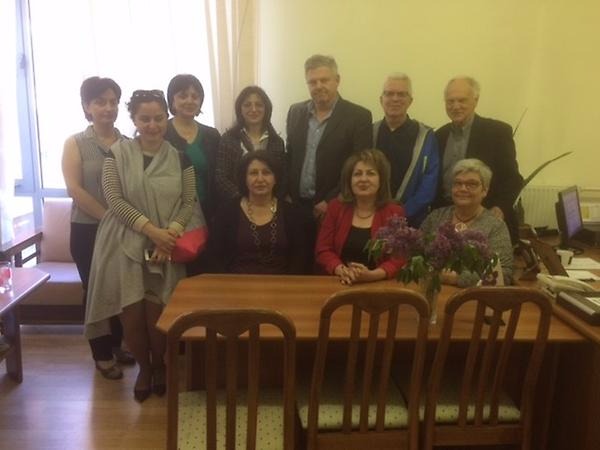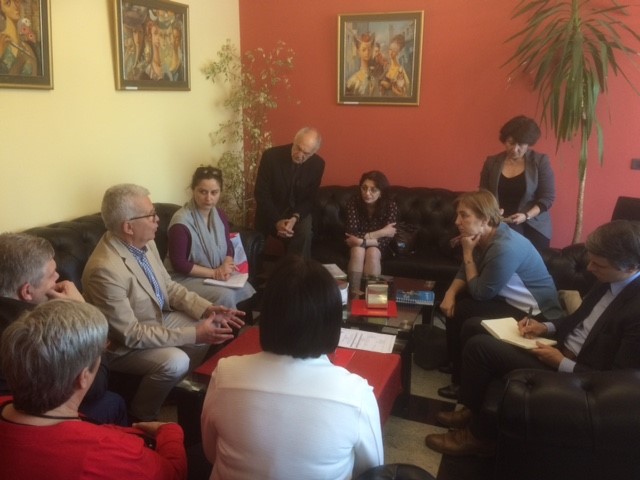Hur gick det? Unicef -projektet i Armenien avslutat
Sedan 2014 har CHILD arbetat med ett UNICEF-projekt i Armenien i syfte att vara rådgivande till den armenska staten i upprättandet av bedömningssystem och lagar inom habilitering- och rehabiliteringstjänst. Nu är projektet avslutat.
"We have been involved in developing a method to determine who has the right for support because of a disability."
CHILD researchers have been involved in a project in Armenia since 2014. The project aimed to support the Armenian government in process of developing a new disability assessment approach for determining who the individuals are that have the right to receive re-/habilitation services and support for having a disability.
The project has been financially supported by UNICEF.
%20Meeting%20with%20Deputy%20minister%20mrs%20Baghdasaryan%20(in%20red),%20some%20national%20work%20groups%20members%20and%20representatives%20from%20UNICEF%20and%20UNDP..jpg)
CHILD-researchers meeting with Deputy Minister Mrs Baghdasaryan (in red), some national work groups members and representatives from UNICEF and UNDP.
The earlier eligibility determination system had to be changed because:
- Armenia has ratified of the UN Convention on the Rights of Persons with Disabilities
- Armenia has developed the Law of the Republic of Armenia “On Social Assistance”
- A Draft for a law of the Republic of Armenia “On Protection of Rights and Social Inclusion of Persons with Disabilities” has been developed
- A Concept Note on “Introduction of the Model of Multidimensional Assessment of Persons with Disability and Disability Determination Based on the WHO ICF Principles” has been decided
- A 2017-2021 Multisectoral Action Plan for Social Inclusion of Persons with Disabilities is decided
- In addition, the existing system was deemed to be expensive for the country and a key issue in Armenia is the fight corruption
The goal of the system change has been to:
Develop a disability definition model enabling multidimensional assessment of persons’ needs to provide more targeted services based on his/her individual needs, ensuring his/her full rehabilitation and contribute to social inclusion
The change process has included developing assessment forms and thresholds for determining disability, training several professional groups in ICF-CY and rehabilitation planning, and changing routines of and organization for eligibility determination.
Our part of the work
In the project we have been involved in developing a method to determine who has the right for support because of a disability. We have also suggested different statistical algorithms to define the thresholds for eligibility. Based on different algorithms the government of Armenia have decided thresholds for determination based on people’s needs and what the country can afford. Small changes in eligibility thresholds can lead to huge differences both in who is eligible and how much money the government has to spend on supporting these persons. We have also trained medical and social experts to train their colleges in using the method for eligibility determination. The changes in eligibility determination have led to changes in the services systems. such as the type of professionals determining eligibility and routines for determining eligibility. We have been involved as consultants in the discussions concerning these organizational changes.
A key part of the project was to systematize a method to determine eligibility using assessment tools based on the International Classification of Functioning, Disability and Health – Child and Youth version (ICF-CY) and culturally valid for Armenia. Members of teams deciding eligibility in the current system participated in a Delphi procedure in 2014 to identify a specified set of codes across the four domains of Body Functions (b), Body Structures(s), Activities & Participation (d) and Environmental Factors (e) that was relevant for Armenia. These codes became the basis for assessment tools to be completed by the applicant and by members of the SMEC team. The assessment tools were further revised in a set of retrospective and prospective pilot test involving 1032 individuals.
Mats Granlund, Project Leader

Lunch meeting with Unicef and UNDP
%20Armenien%202016.jpg)
Unicef-seminars